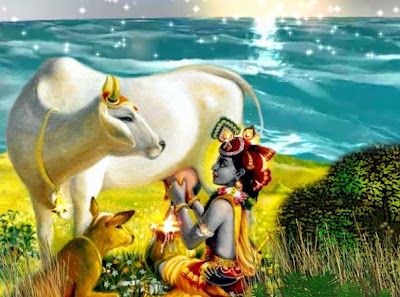yāta-yāmaḿ gata-rasaḿ
pūti paryuṣitaḿ ca yat
ucchiṣṭam api cāmedhyaḿ
bhojanaḿ tāmasa-priyam
TRANSLATION
Food prepared more than three hours before being eaten, food that is tasteless, decomposed and putrid, and food consisting of remnants and untouchable things is dear to those in the mode of darkness.
PURPORT
The purpose of food is to increase the duration of life, purify the mind and aid bodily strength. This is its only purpose. In the past, great authorities selected those foods that best aid health and increase life’s duration, such as milk products, sugar, rice, wheat, fruits and vegetables. These foods are very dear to those in the mode of goodness. Some other foods, such as baked corn and molasses, while not very palatable in themselves, can be made pleasant when mixed with milk or other foods. They are then in the mode of goodness.
All these foods are pure by nature. They are quite distinct from untouchable things like meat and liquor. Fatty foods, as mentioned in the eighth verse, have no connection with animal fat obtained by slaughter. Animal fat is available in the form of milk, which is the most wonderful of all foods. Milk, butter, cheese and similar products give animal fat in a form which rules out any need for the killing of innocent creatures. It is only through brute mentality that this killing goes on. The civilized method of obtaining needed fat is by milk. Slaughter is the way of subhumans. Protein is amply available through split peas, dāl, whole wheat, etc.
Foods in the mode of passion, which are bitter, too salty, or too hot or overly mixed with red pepper, cause misery by reducing the mucus in the stomach, leading to disease. Foods in the mode of ignorance or darkness are essentially those that are not fresh. Any food cooked more than three hours before it is eaten (except prasādam, food offered to the Lord) is considered to be in the mode of darkness. Because they are decomposing, such foods give a bad odor, which often attracts people in this mode but repulses those in the mode of goodness.
Remnants of food may be eaten only when they are part of a meal that was first offered to the Supreme Lord or first eaten by saintly persons, especially the spiritual master. Otherwise the remnants of food are considered to be in the mode of darkness, and they increase infection or disease. Such foodstuffs, although very palatable to persons in the mode of darkness, are neither liked nor even touched by those in the mode of goodness. The best food is the remnants of what is offered to the Supreme Personality of Godhead.
In Bhagavad-gītā the Supreme Lord says that He accepts preparations of vegetables, flour and milk when offered with devotion. Patraḿ puṣpaḿ phalaḿ toyam. Of course, devotion and love are the chief things which the Supreme Personality of Godhead accepts. But it is also mentioned that the prasādam should be prepared in a particular way. Any food prepared by the injunctions of the scripture and offered to the Supreme Personality of Godhead can be taken even if prepared long, long ago, because such food is transcendental. Therefore to make food antiseptic, eatable and palatable for all persons, one should offer food to the Supreme Personality of Godhead.
Bhagavad-gītā As It Is 17.10













